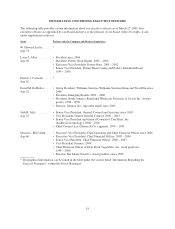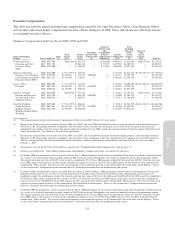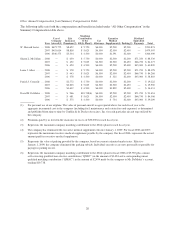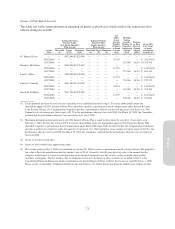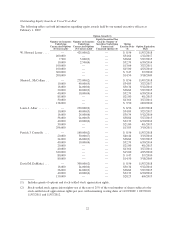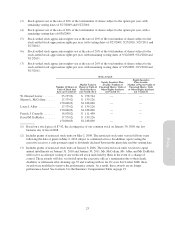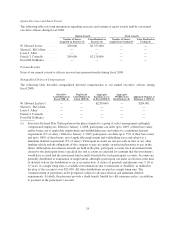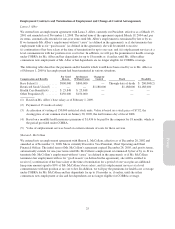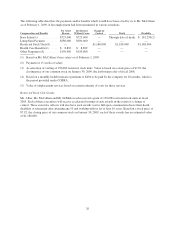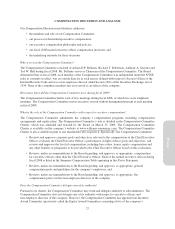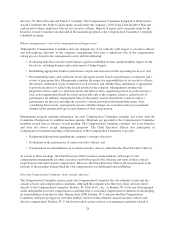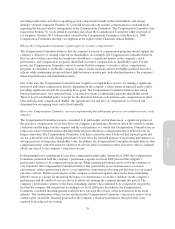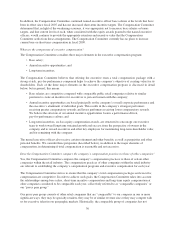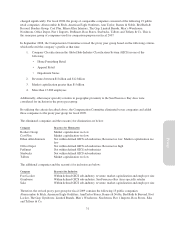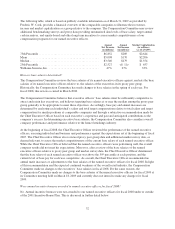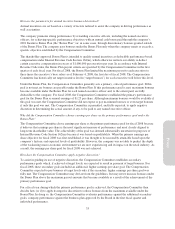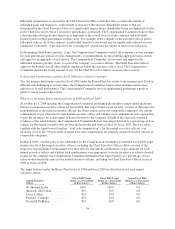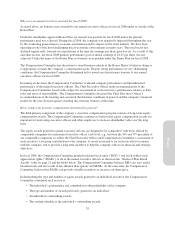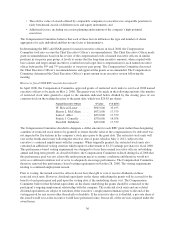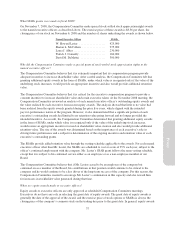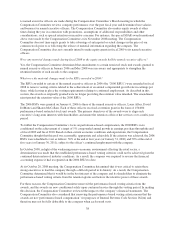Pottery Barn 2008 Annual Report Download - page 126
Download and view the complete annual report
Please find page 126 of the 2008 Pottery Barn annual report below. You can navigate through the pages in the report by either clicking on the pages listed below, or by using the keyword search tool below to find specific information within the annual report.directors, W. Howard Lester and Patrick J. Connolly. The Compensation Committee delegated to the Incentive
Award Committee the ability to grant equity awards under the company’s 2001 Long-Term Incentive Plan and
cash awards to those employees who are not executive officers. Reports of equity and cash grants made by the
Incentive Award Committee are included in the materials presented at the Compensation Committee’s regularly
scheduled meetings.
What is management’s role in the compensation-setting process?
Although the Compensation Committee does not delegate any of its authority with respect to executive officers
and non-employee directors of the company, management does play a significant role in the compensation-
setting process. In particular, management assists with the following:
• Evaluating individual executive performance against established revenue and profitability targets for the
fiscal year, including business unit achievement of budget targets;
• Establishing appropriate business performance targets and objectives for the upcoming fiscal year; and
• Recommending salary and cash bonus levels and equity awards based on performance evaluations and a
review of peer group data. Management considers the respective responsibilities of its executive officers,
the current combination of pay elements for each executive and whether that combination is appropriate
to provide incentives to achieve the desired results for the company. Management considers the
proportion of base salary to cash bonus levels and believes that a significant portion of each executive’s
total cash compensation should be at risk and payable only if the company achieves certain levels of
performance. In addition, management believes that equity awards should reflect each executive’s
performance for the year and align the executive’s financial reward with shareholder return. After
considering these factors, management assesses whether changes are warranted and may recommend
changes in the amount and type of each element of total compensation.
Management prepares meeting information for each Compensation Committee meeting and works with the
Committee Chairperson to establish meeting agendas. Materials are provided to the Compensation Committee
members several days in advance of each meeting. The Compensation Committee considers, but is not bound to
and does not always accept, management proposals. The Chief Executive Officer also participates in
Compensation Committee meetings at the invitation of the Compensation Committee to provide:
• Background information regarding the company’s strategic objectives;
• Evaluations of the performance of senior executive officers; and
• Compensation recommendations as to senior executive officers (other than the Chief Executive Officer).
At certain of these meetings, the Chief Executive Officer made recommendations with respect to the
compensation arrangements for other executives and with respect to the structure and terms of those officers’
target bonuses and equity-based compensation. However, the Chief Executive Officer did not participate in the
portions of the meetings during which his own compensation was deliberated and established.
Does the Compensation Committee have outside advisors?
The Compensation Committee charter grants the Compensation Committee the sole authority to hire and fire
outside advisors and compensation consultants. Although the company pays their fees, these advisors report
directly to the Compensation Committee. Frederic W. Cook & Co., Inc., or Frederic W. Cook, has been engaged
as the independent executive compensation consulting firm to assist the Compensation Committee in discharging
its responsibilities from time to time. During fiscal 2008, Frederic W. Cook provided the Compensation
Committee with peer group proxy and other publicly disclosed data related to named executive officers and
director compensation. Frederic W. Cook also provided certain services to management, primarily related to
28


